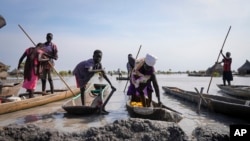The United Nations refugee agency says that South Sudanese flood victims are in desperate need of international support.
Climate change is wreaking havoc on Africa. Aid agencies struggle to provide food and other aid to millions of people suffering from four years of devastating drought in the Horn of Africa. To the west, South Sudan is dealing with the impact of four years of historic flooding.
The U.N. refugee agency says four years of record rains have flooded two-thirds of the country. It warns the climate emergency displacing increasing numbers of people and making life harder for those already uprooted by the catastrophic rains.
UNHCR spokesman, Boris Cheshirkov told reporters Friday that worse is to come as the climate crisis accelerates.
“Over 900,000 people have been directly impacted. Waters have swept away homes and livestock, forced thousands to flee, and inundated large swathes of farmland, worsening an already dire food emergency. Boreholes and latrines have been submerged, contaminating water sources, and risking the outbreak of disease,” he said.
The U.N. Office for the Coordination of Humanitarian Affairs says flooding has inundated nine of the country’s 10 states, including oil-rich Unity, Warrap, Upper Nile, and Jonglei states. It says these states are sheltering hundreds of thousands of people fleeing conflict and weather.
Cheshirkov said Bentiu, Unity’s capital, has become an island surrounded by floodwaters. He says all roads in and out of the city are impassable and it is only reachable by boat or air.
While the flooding is blocking aid delivery to those most in need, he said aid workers also are having a tough time reaching ethnic conflict areas.
“It is a cycle, which then promotes further displacement or makes it much more difficult for people because they have heightened protection needs. … Sexual exploitation and abuse, of course, this is one of the top priorities for our teams. It is to make sure that all the work that can be done to prevent and if there are cases to respond. But that is also one of the top priorities for us,” he said.
Cheshirkov said the UNHCR has received only 44% of the nearly $215 million it needs for its South Sudan operation this year. Priority needs, he said, include food, shelter, water, and sanitation supplies as stocks of basic items are running out.




